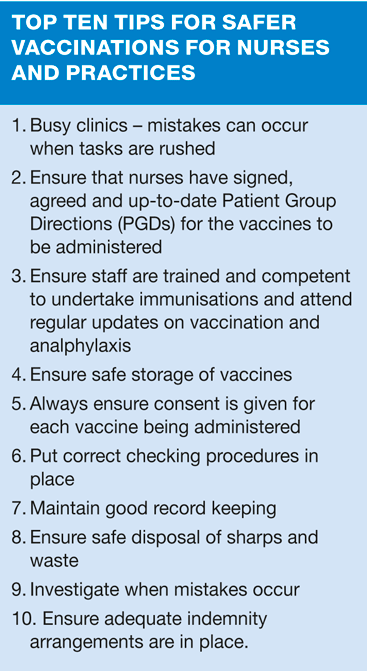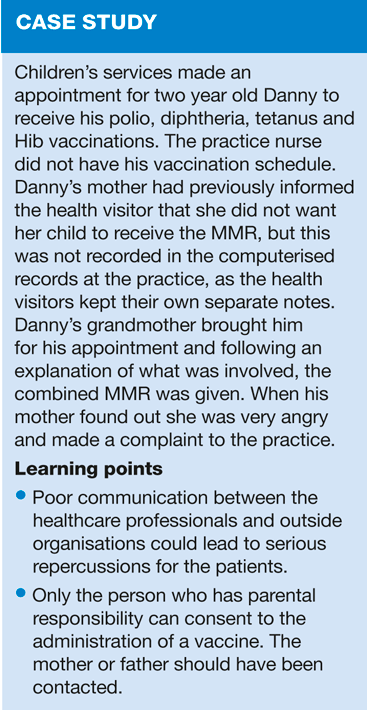Vaccinations - in safe hands?
Diane Baylis
Diane Baylis
RN
Clinical Risk Manager,Medical Protection Society
Administering vaccinations and immunisations is a routine task for practice nurses, but even in the most meticulously run practices, mistakes can happen, often occurring in tasks that are undertaken regularly
Nurses are a major force in administering vaccinations, not only childhood immunisations but also travel and flu vaccines. In agreeing to undertake this work, nurses should ensure that they keep up to date with all aspects of immunisation and practise within their competencies.
Claims and complaints relating to vaccination errors in general practice can be common.
Reasons include:
- Wrong vaccination administered
- Vaccination given without parental consent or against the parents' wishes
- Adult dose of a vaccine given to a child
- Out of date vaccination administered
- Extra set of childhood immunisations given in error
- Vaccination given that has been incorrectly stored and is ineffective.
BUSY CLINICS
Administering vaccinations and immunisations during a busy clinic can be stressful. Consider the organisation of the clinic; healthcare professionals should have sufficient time between appointments as mistakes can happen when tasks are rushed. Consider having two people, such as a nurse and healthcare assistant (HCA), running the clinic. The HCA could complete the paperwork and check the vaccines, while the nurse administers the vaccine and looks after the patient.
HUMAN FACTORS
Most practices have systems in place to ensure that staff follow the correct procedure and protect the patient. However, we must not discount the human factors, such as:
- Fatigue
- Hunger
- Lack of concentration
- Stress
- Distraction
- Lack of training
- Lack of access to information
- Illness and/or medication
Being aware of these factors can help nurses to overcome potential risks.
TRAINING
The practice nurse must be competent and trained to administer vaccines as they will be accountable for the tasks they undertake.1
Nurses who are not nurse prescribers should have signed and agreed, up-to-date Patient Group Directions (PGDs) for the vaccines to be administered.2
The new immunisation schedule can be complicated, so it is essential that all healthcare professionals administering vaccines are familiar with the schedule and attend regular training. Annual training should be undertaken in the management of anaphylaxis and paediatric cardiopulmonary resuscitation.
STORAGE OF VACCINES
Instances of improper vaccine storage and handling continue to be reported to the Health Protection Agency (HPA),2 and guidance is regularly shared on the management of serious untoward vaccine incidents, most notably where incorrectly stored vaccines have been administered.3
Vaccines should be stored in the refrigerator in an organised way and be well labelled. It is also important to remember:
- Different childhood vaccines should be stored on separate shelves and adult vaccines should be stored in a separate refrigerator
- Vaccines with similar packaging should not be stored next to each other
- The minimum and maximum refrigerator temperatures should be recorded daily
- Ensure that stock is rotated regularly and have a system for checking vaccine expiry dates
- Keep a record of destroyed vaccines.
CONSENT
Even where the nurse has previously discussed the immunisation schedule with the parent, it is important to revisit this to ensure that consent is obtained for each vaccine.
Parents should feel involved in the procedure, have their concerns addressed, including a discussion about the potential risks and side effects, and fully understand what vaccines their child is being given.
Particular care should be taken to ensure that consent has been obtained from the person who has parental responsibility.4
- The mother would be assumed to have parental responsibility (unless removed by the court.)
- The father, in accordance with the Childrens Act (1989), would have parental responsibility if:
- He was married to the mother when the child was born
- The child's birth was registered after 1 December 2003 in England and Wales, 15 April 2002 in Northern Ireland, 4 May 2006 in Scotland, and the father's name is on the birth certificate (unless it has been removed by the court)
- He holds a custody or residence order
- A parental responsibility agreement exists with the mother
- Other individuals or organisations (such as social services) may be given parental responsibility by a court order or by being appointed as a guardian
- Grandparents do not have parental responsibility unless granted by a court order.
CHECKING PROCEDURES
Nurses should be familiar with the relevant guidance on which immunisation to use and double check before administering any immunisations. They should also check:
- Any previous reactions to vaccines
- That the child is fit to receive an immunisation
- Agreed injection site for specific vaccines
- The child's immunisation schedule
- That the child has not already been given the intended vaccine
- Expiry dates for each vaccine.
Childhood immunisations represent a significant risk for children who:
- Have recently moved to the practice, and whose records have not yet arrived
- Do not have a child health book
- Have come from abroad where there is a different immunisation schedule
- Are involved in catch up programmes.
RECORD KEEPING
Detailed and contemporaneous medical records are essential for continuity of care. Record the following in the child's records:
- Name of the vaccines
- Batch numbers
- Sites used
- Expiry dates.
It is important to document the consent obtained, including who gave consent and any concerns they had, as well as any information leaflets you provided.
SHARPS AND WASTE
Ensure the immediate and safe disposal of needles and sharps into appropriate, puncture-proof bins, to prevent needlestick injuries and exposure to blood-borne viruses. An up-to-date sharps injury policy should be in place.
SIGNIFICANT EVENT ANALYSIS
When errors occur, apportioning blame is not the answer; it's more productive for practices to use adverse events as a learning tool. Significant event analysis offers an opportunity to:
- Investigate the incident thoroughly
- Share and learn - encourage full and frank discussions with all staff involved
- Carefully examine the steps that led to the incident
- Identify areas to improve patient safety
- Feed back the findings to the family
- Support the staff involved and consider their learning and training needs.
The HPA has published guidance on actions to take in response to vaccine errors.5
SUMMARY
Nurses are increasingly delegated the duties of vaccine administration, and in agreeing to undertake this work, nurses assume professional accountability. Nurses should ensure they have appropriate training, work within their capabilities and are aware of other areas of risk that may affect their work.
REFERENCES
1. Nursing and Midwifery Council. The code: Standards of conduct, performance and ethics for nurses and midwifes. London (2008)
2. Department of Health. Patient group directions (England only) HSC, 026 (2000)
3. From April 2013 the HPA will become part of Public Health England - http://www.hpa.org.uk/AboutTheHPA/
4. MPS has a factsheet on parental responsibility, which can be viewed at: http://www.medicalprotection.org/uk/england-factsheets/parentalresponsibility
5. The Health Protection Agency. Vaccine incident guidance
http://www.hpa.org.uk/webc/HPAwebFile/HPAweb_C/1267551139589
Related articles
View all Articles


